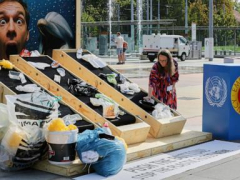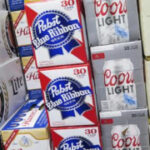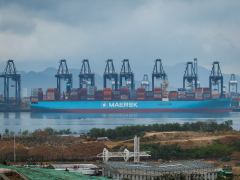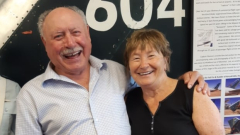GENEVA — A Swiss ocean protection group is handing out bars of soap to negotiators working on a global accord to end plastic pollution.
The messaging on the cardboard box from the Geneva-based Gallifrey foundation reads “no dirty tricks, vote for a clean plastics treaty.”
As Thai diplomat Jutha Saovabha walked to the treaty talks Wednesday morning, Gallifrey Foundation spokesperson Laurianne Trimoulla stopped him to chat and handed him a soap. Saovabha said it was a lovely gift and he liked the plastic-free packaging.
Nations are crafting the first global, legally binding treaty on plastics pollution. The meeting at the United Nations office in Geneva is supposed to be the last and people are getting creative to put the pressure on to get a deal done.
Here is a look at what they’re doing:
Trimoulla said they chose soap because Switzerland is known for its cleanliness, and democracy. She said it’s a “cheeky” way to deliver a serious message.
The foundation partnered with Friends of the Earth International and the Break Free From Plastic movement to urge delegates to vote on the treaty. Currently, every nation must agree for any proposal to be included in the treaty. If consensus can’t be reached on the last day, the process could become paralyzed. The talks are scheduled to conclude Thursday.
On Wednesday, Trimoulla had about 10 organic soaps left to hand out out of nearly 400. She said many delegates liked the gift, including those from France, Panama, and “even the United States.” The foundation wants the treaty to reduce plastic production, whereas the U.S. supports provisions focused on better waste management and reuse to reduce plastic pollution.
The International Pollutants Elimination Network gave wristbands to UN officials, delegates and plastic waste workers before the talks to measure their exposure to chemicals used to make plastics and show the importance of protecting human health with the treaty. It’s releasing a report Wednesday about the findings.
IPEN cochair Pamela Miller said the treaty is “all about oil versus our health.” Most plastic is made from fossil fuels.
Camila Zepeda, of Mexico, wore one. Zepeda is now leading negotiations for Mexico on an article to address problematic plastic products, including single-use plastics and chemicals.
“I had





